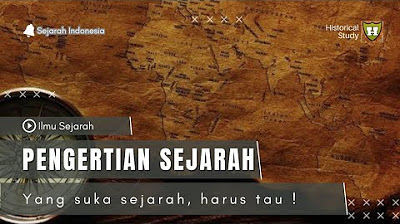Varieties of History
Summary
TLDRThis video script delves into the complexity and variety of history as a discipline, emphasizing that historians approach the past differently based on their interests and perspectives. It outlines the 'big five' main varieties of history: political, military, social, cultural, and women's history, each with its unique focus. The script also highlights how these fields have evolved over time and uses a humorous example to illustrate the diverse questions historians ask, emphasizing the dynamic nature of historical study.
Takeaways
- 📚 History is a complex and continuous discipline with no single definitive version of events, emphasizing interpretation and revision.
- 🔍 Historians are distinguished by their areas of study, the subjects they choose, and the questions they aim to answer through their research.
- 🌟 Identity of a historian is defined by a combination of who they study, what they study, and the purpose of their study.
- 👥 The way historians approach history can be as varied as the historians themselves, with individual perspectives shaping the narrative.
- 🏛 Political history is one of the oldest varieties, focusing on leaders, events, movements, and systems of power.
- 🛡 Military history examines wars, conflicts, and the individuals and societies affected by them.
- 👥 Social history looks at the lives of ordinary people, daily life, and is often seen as a counterpoint to political history.
- 🎭 Cultural history explores the construction, sharing, and contesting of meaning within societies.
- 👩🦳 Women's history focuses on the history of women and their roles in society, often serving as a revisionist approach to dominant narratives.
- 🌐 There are countless varieties of history, each with its own focus and methodologies, reflecting the diverse interests of historians.
- 📈 The field of history is dynamic, with new varieties emerging and existing ones evolving over time in response to changing societal needs and interests.
Q & A
What does the speaker mean when they say history is complex?
-The speaker means that history is not a single narrative but is interpreted from various perspectives, using different sources, and is subject to continuous revision and reinterpretation.
How does the speaker define the identity of a historian?
-The speaker defines a historian's identity as a combination of what they study (the 'who' and 'what' of history) and why they study it, which helps to determine the type of history they specialize in.
What are the 'big five' varieties of history mentioned in the script?
-The 'big five' varieties of history mentioned are political history, military history, social history, cultural history, and women's history.
What is the focus of political history?
-Political history focuses on the history of political leaders, events, movements, groups, and systems of power.
How is military history defined in the script?
-Military history is defined as the history of wars, conflicts, and the people who fight in them or are affected by them.
What is the main subject of social history?
-Social history is the history of ordinary people, their daily lives, and is often considered the 'other side of the story' to political history.
What does cultural history examine?
-Cultural history examines the history of meaning, how it is constructed, shared, and contested in society.
Why is women's history often considered a revisionist history?
-Women's history is often considered revisionist because it is written as a reaction to dominant, normative histories, aiming to provide a more inclusive perspective on women's roles in society.
How does the script illustrate the diversity of historical approaches?
-The script uses the example of historians from different fields interpreting the same question ('Why did the chicken cross the road?') to show how their unique focuses lead to diverse interpretations.
What is the purpose of the module discussed in the script?
-The purpose of the module is to explore the development of history as a discipline, the varieties of professional history, and how historians study the past differently.
How does the script suggest historians approach the past?
-The script suggests that historians approach the past by focusing on different aspects of human behavior, using various sources and methods, and forming groups of like-minded scholars.
Outlines

Cette section est réservée aux utilisateurs payants. Améliorez votre compte pour accéder à cette section.
Améliorer maintenantMindmap

Cette section est réservée aux utilisateurs payants. Améliorez votre compte pour accéder à cette section.
Améliorer maintenantKeywords

Cette section est réservée aux utilisateurs payants. Améliorez votre compte pour accéder à cette section.
Améliorer maintenantHighlights

Cette section est réservée aux utilisateurs payants. Améliorez votre compte pour accéder à cette section.
Améliorer maintenantTranscripts

Cette section est réservée aux utilisateurs payants. Améliorez votre compte pour accéder à cette section.
Améliorer maintenant5.0 / 5 (0 votes)






